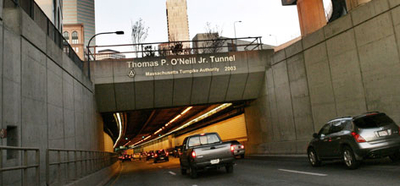RENAMING A branch of the Boston Public Library for William Bulger, one of the more sordid Massachusetts politicians in recent decades, may not be the worst idea City Council President Bill Linehan has ever floated, though offhand I can't think of one that tops it.
 One of Boston's many "monuments to me" — the J. Joseph Moakley federal courthouse |
That's not quite the way I would describe the vindictive pol who put loyalty to his serial-murdering brother above any commitment to the people or the law. Still, I realize that Bulger has some sincere admirers, Linehan perhaps among them. So I'd like to tender a proposal of my own. If they're serious about wanting Bulger's name to adorn the brick-and-glass facade of the South Boston branch library, let them offer the library board of trustees a generous naming gift, and raise the money themselves.
On the same day the Globe reported Linehan's call to name the library after Bulger, the mail brought an invitation to the dedication next month of the new Sumner M. Redstone Building at the Boston University School of Law. Redstone, a billionaire media mogul, last year donated $18 million to support the construction of the five-story addition to BU's law school (where he taught entertainment law for several years in the 1980s). Redstone and Boston University, like countless other private benefactors and institutions, take it for granted that naming rights should be paid for by those receiving the honor.
 Former Boston Mayor Kevin H. White and the larger-than-life statue of him near Faneuil Hall |
Only politicians are vain enough to think that naming rights and other tributes are an entitlement, to be underwritten not with their money but with everyone else's.
You can hardly turn a corner in Boston without coming across a building or bridge or park or roadway named for a politician or a politician's relatives. The Moakley courthouse. The Fitzgerald Expressway. The McCormack federal building. The Rose Kennedy Greenway. The Saltonstall state office building. The Tobin Bridge. The O'Neill Tunnel. The Menino Pavilion. The Hynes Convention Center. The statues of Kevin White and James Michael Curley. Some politicians have two, three, or even four of these "monuments to me," as they've been dubbed. Besides the federal courthouse named for former Congressman Joe Moakley, there is a Moakley park, a Moakley academic center, and a Moakley medical building. There's even an Evelyn Moakley bridge named for his wife.
And the "monuments to me" keep proliferating.
Boston Mayor Marty Walsh announced last week that a historic building in Roxbury's Dudley Square is to be renamed for Bruce Bolling, the late City Council president. A commission is being created by Linehan and City Councilor Stephen Murphy to scout out locations for a statue or other shrine to "celebrate" former Mayor Ray Flynn. Massachusetts politicos may not be quite as far gone in this addiction to self-glorification as some public officials. (It takes five pages to print Wikipedia's list of places named after former US Senator Robert Byrd of West Virginia.) But we're headed that way.
Can't we call a halt to this taxpayer-funded ego-stroking of people who are supposed to be public servants, not public deities?
 Part of Boston's grossly overpriced Big Dig is the tunnel named for former House Speaker Tip O'Neill |
Once upon a time it was understood that public entities shouldn't be named for still-living politicians. Some admirable officials were even content to let their life's work be their monument. How quaint that seems in our age of fame junkies and self-idolatry, when for too many politicians it's all about the monument, and not nearly enough about the work. Reversing that trend is a daunting task. Refusing to name things after politicians would be a good way to start.
(Jeff Jacoby is a columnist for The Boston Globe).
-- ## --
Follow Jeff Jacoby on Twitter.
Discuss his columns on Facebook.
Want to read more? Sign up for "Arguable," Jeff Jacoby's free weekly email newsletter.

